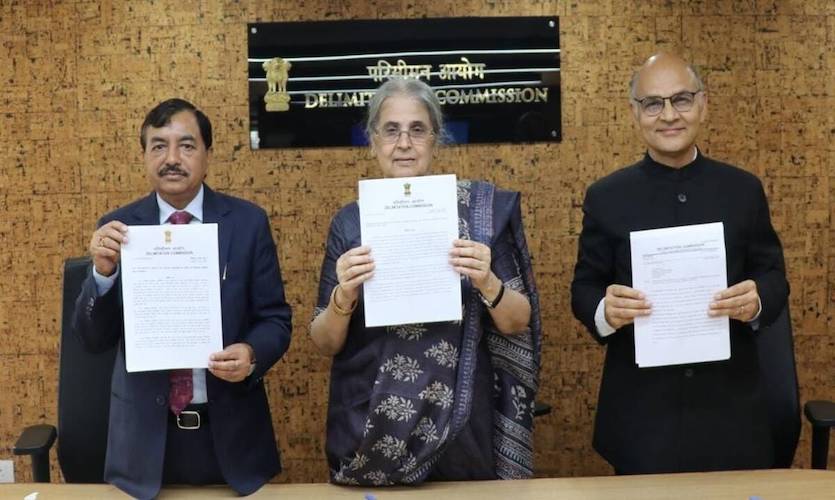The Jammu and Kashmir Delimitation Commission, which was given the responsibility of replotting the assembly constituencies, met on Thursday, to conclude the procedure for finalising the plan for the union territory of Jammu & Kashmir. For the first time, there will be nine reserved seats for those belonging to Scheduled Tribes (STs). The commission also decided that all five assembly constituencies will have the same number of seats as Parliamentary constituencies.
According to the Indian Express, the gazette notification for the same was also published on Thursday. The final Delimitation Order has assigned 43 constituencies in the Jammu region, and 47 constituencies in Kashmir. This is in accordance with the provisions of Section 9 (1) (a) of the Delimitation Act, 2002, and Section 60 (2) (b) of the Jammu & Kashmir Reorganisation Act, 2019.
A total of nine assembly constituencies have been reserved for STs after consultation with associate members, representatives of political parties, citizens, and civil society groups. Six of these constituencies are in the Jammu region, and three are in Kashmir.
Parliamentary seats are spread across five constituencies in the region. The Jammu & Kashmir region has been considered as one union territory by the Delimitation Commission. The Anantnag region in Kashmir Valley has been combined with Rajouri and Poonch in Jammu region to form one of the Parliamentary constituencies. With this reorganisation, each Parliamentary constituency will have an equal number of assembly constituencies. Additionally, some of the assembly constituencies have been renamed in response to local requests.
“It may be recalled that the Delimitation Commission was constituted by the Govt. of India, in the exercise of powers conferred by Section 3 of Delimitation Act, 2002 (33 of 2002), for the purpose of delimitation of Assembly and Parliamentary Constituencies in the Union Territory of Jammu & Kashmir. The Commission associated in its work, 5 members of Lok Sabha elected from the UT of Jammu and Kashmir. These Associate Members were nominated by the Hon’ble Speaker of Lok Sabha,” said the Election Commission.
It added that in accordance with relevant provisions of the Constitution (Article 330 and Article 332) and Section 14 of the J&K Reorganisation Act, the number of seats to be reserved for Scheduled Castes (SCs) and STs in the legislative assembly of the Jammu and Kashmir UT was calculated based on the 2011 census. The Delimitation Commission has reserved 9 assembly constituencies for STs for the first time and 7 for SCs. The document highlighted that the constitution of the erstwhile Jammu and Kashmir state did not provide for reservations in the legislative assembly for STs.
Despite the fact that the commission was supposed to complete the delimitation process in a year, it was given a year’s extension on March 4 this year. This was done at the request of the panel members, as it was unable to make substantial headway owing to the COVID-19-caused closure across the country.
Ex-officio members of the delimitation panel are Election Commissioner Sushil Chandra, and J&K State Election Commissioner KK Sharma, headed by Justice (retd) Ranjana Desai. Aside from them, the panel has five associate members: National Conference MPs Farooq Abdullah, Mohammad Akbar Lone, and Hasnain Masoodi; Union Minister of State in the Prime Minister’s Office, Dr Jitendra Singh; and BJP MP Jugal Kishore Sharma.
According to a statement by the Poll Panel, the Jammu and Kashmir Reorganisation Act and the Delimitation Act established the basic limits within which the delimitation process was to take place. However, for smooth functioning and effective outcomes, the commission devised separate guidelines and methodology for the delimitation of assembly and parliamentary constituencies, which were followed during the delimitation process.
Read more: ‘Not A One Day Protest,’ Says Raj Thackeray; Over 200 Detained Amid Loudspeaker Row
It went on to say that the commission had decided that the constituencies would be delimited with regard to the administrative units such as districts, tehsils, patwari circles, and so on, “as in existence on 15-06-2020”, and that it had communicated to the UT administration not to disturb these until the delimitation exercise was completed.
In addition, the statement issued said that the commission guaranteed that every assembly constituency was included wholly in one district, and that the lowest administrative divisions namely the Patwar Circles (and wards in Jammu Municipal Corporation) were not broken and remained in a single assembly constituency.
In July 2021, the Delimitation Commission visited Jammu and Kashmir to meet with political leaders and civil society organisations and solicit feedback on the effort to redesign electoral seats in the union territory. The decision to visit Jammu and Kashmir was made during a meeting of the panel in June 2021, at the Election Commission’s office in Delhi. The redrawing of electoral seats was required when Jammu and Kashmir was divided into two union territories on August 5, 2019, with the repeal of Article 370, which accorded the former state special status.










